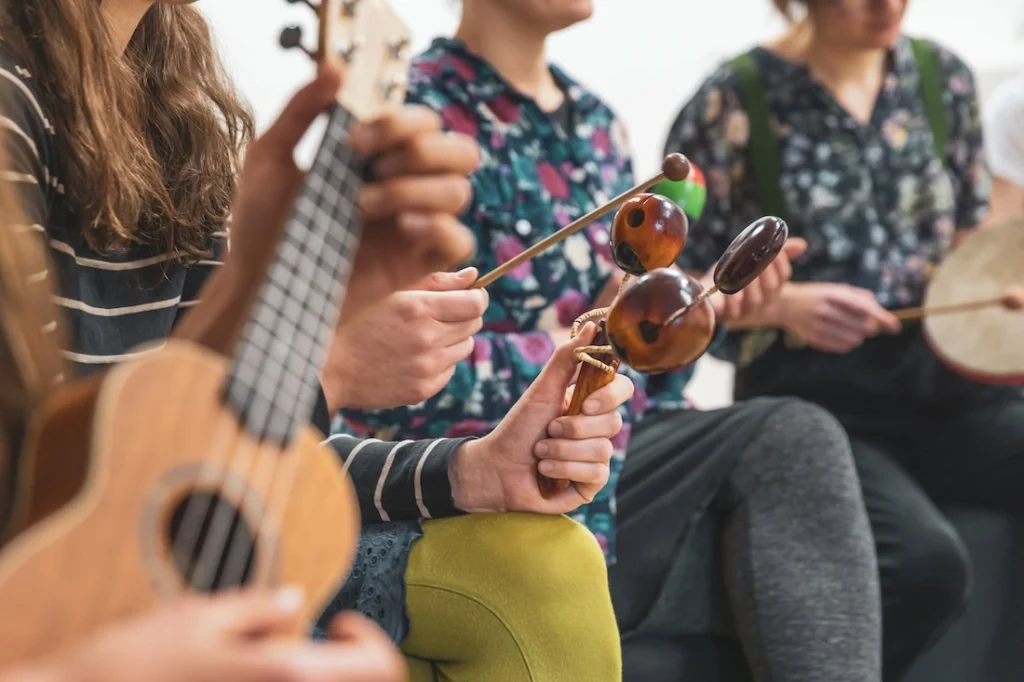A German author, Berthold Auerbach, once noted that music washed the dust of everyday life away from the soul. Music for addiction recovery has long been used as a treatment option and, in the last few decades, been recognized as an effective, evidence-based practice. Music and addiction recovery also extends to art therapy, another form of treatment that is equally effective for those in need.
What is Music Therapy in Addiction Recovery?
Every day people are inundated with sounds, noises that can distract but music and music therapy is a way to make noise a positive form of medicine particularly for those in recovery.
Music therapy has been tested in clinical settings, schools, and addiction recovery centers.
How does music for addiction recovery work?
It looks different for everyone but typically involves a music therapist who runs individual or group rehab programs, sessions, or listening activities. Professional music therapists can help you apply music to:
- Addiction recovery
- Pain management, particularly after detox
- Cravings
- Anxiety
- Depression
- Self-esteem
- Thought patterns
With individual or group sessions, music therapists will offer somewhat individualized programs as some people don’t find heavy metal relaxing during detox, while others find it exactly what they need.
Music therapy can involve:
- Listening to music being played
- Playing a new instrument
- Singing along to a song
- Creating music
No matter your level of participation, music therapy in addiction recovery provides an alternative avenue for communication, especially for people who have difficulty explaining or describing difficult emotions. Representative Gabby Giffords underwent music therapy to help her be able to speak and communicate after she was shot, and it has been used successfully in rehab centers for similar communication purposes.
What are the Benefits of Music for Addiction Recovery?
Singing or playing breath instruments can support your breathing and help you calm your breathing when you are feeling anxious. Learning to play an instrument or sing along to music reinforces creativity and releases hormones that improve your mood. Listening to music can help you feel at ease. So, what are the other benefits of music for addiction recovery?
- Memory: Music therapy has been shown to reduce the effects of dementia, so it can help improve memory, something that is often lost or diminished as a result of drug use
- Pain Relief: It has been shown to relieve pain in clinical and hospital settings, which indicates that it can help you manage the pain associated with detox and early recovery
- Communication: Music and addiction recovery help you improve your communication, especially when it comes to difficult emotions
- Anxiety: Music therapy has been shown to help people with Alzheimer’s feel less anxious, and those who are in recovery can also feel less anxious when listening to their favorite songs
There are other benefits as well. In a group setting, recent German and Swiss studies have revealed that live music synchronizes heart rates, respiration rates, and skin conductance for those who are listening. If you are part of a group music therapy session and all of you are listening to someone perform live music, this means that your cardiac activity and electrodermal activity synchronize with everyone else, helping to develop stronger relationships and greater empathy.

What is Art Therapy in Addiction Recovery?
Similar to music therapy for addiction recovery, art therapy is another holistic avenue that has been shown to positively treat things like unresolved trauma, PTSD, and addiction.
Art therapy has been used by licensed therapists since the 1940s. Art therapy, like music therapy, does not require any level of skill or experience in order to be beneficial. The things you do with a qualified art therapist or instructor might be as simple as:
- Using watercolors to fill in a coloring book
- Making cards
- Coloring with crayons
- Drawing
- Painting
- Doing paper mache
- Finger Painting
- Making things with modeling clay
There are several benefits to each of these mediums, and what is offered might look different from one person to the next. For example, someone who is struggling with anxiety might use an anxiety coloring book with several repetitive patterns to help give them a sense of control, whereas someone who is struggling with physical tension might use finger painting or modeling clay to release that tension in a healthy fashion.
What are the Benefits of Art Therapy for Addiction Recovery?
Numerous case studies indicate that art therapy can help people in recovery.
- Creativity: Art offers a creative outlet that can help improve neuropsychiatric symptoms, boost social behaviors, and increase your self-esteem
- Mindfulness: Art can help you focus on mindfulness, being focused on the present moment instead of the past or the future, which boosts mood and improves overall recovery
- Anxiety: Art therapy can reduce anxiety, especially when you are struggling with panic attacks or panic cycles, by disrupting that cycle to work on repetitive patterns
- Stress Management: Art therapy, like tearing pieces of paper to make a collage, can help manage stress or anxiety, especially when people feel like life is spiraling out of their control
The best thing about art therapy is that there is no right or wrong answer, much the same as music therapy. There is no perfect way to put colored paper in a textured mosaic. There is no perfect color. Instead, it is something over which you have control.
At Casa Serena, we are here to help you with your recovery using a wide range of holistic treatments, including art and music therapy for addiction recovery. With our outpatient rehab for women, you can work with several qualified therapists to incorporate art and music therapy into your recovery.
Contact our admissions team if you are ready to learn more about the benefits of music and addiction recovery.



